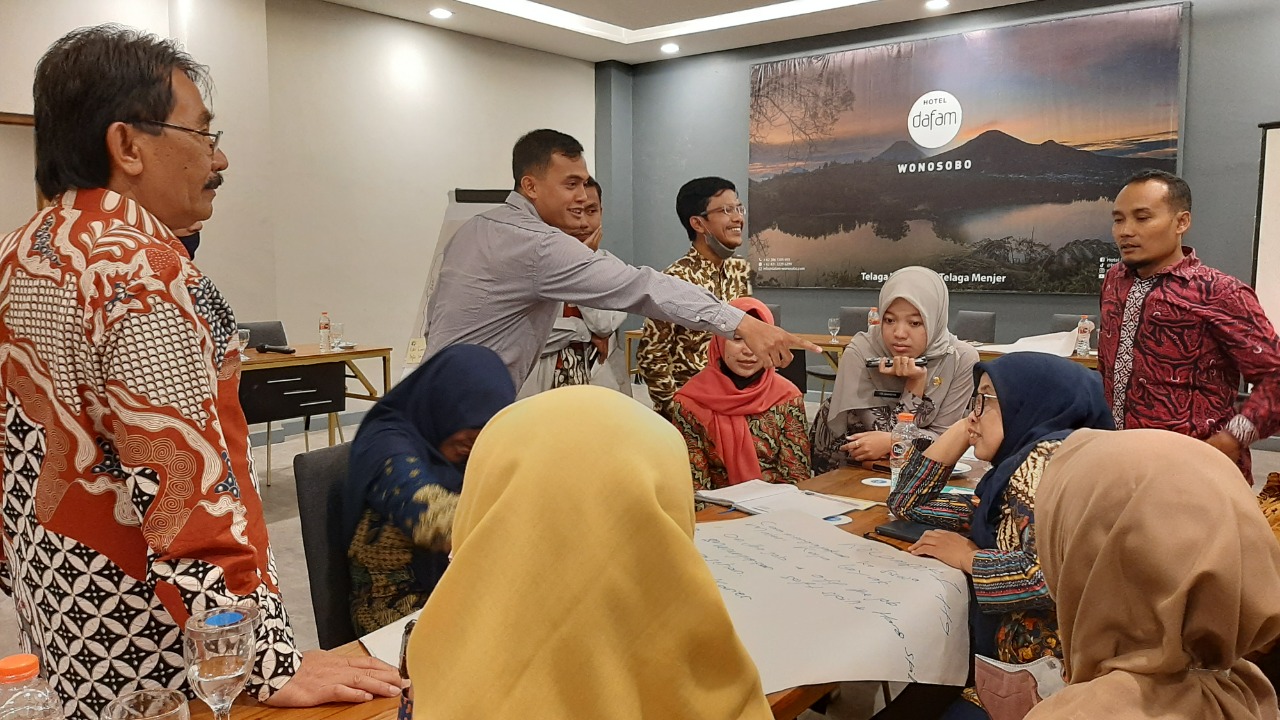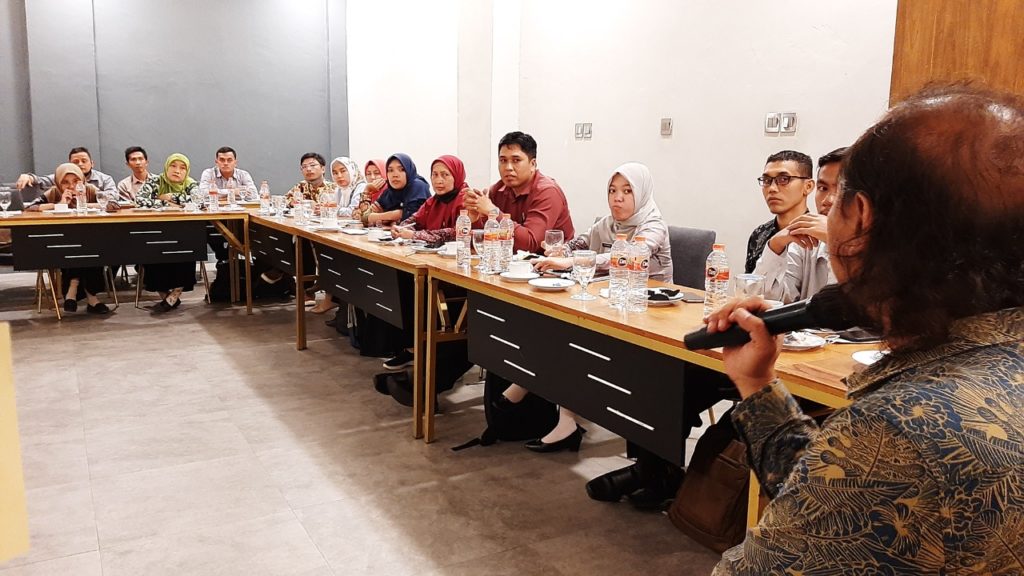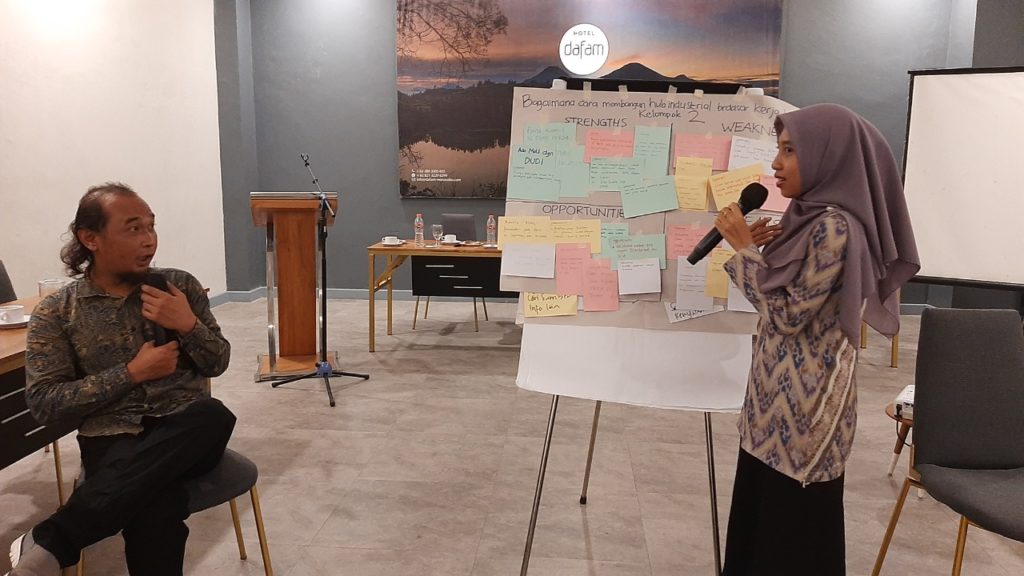
The INFEST Yogyakarta Foundation collaborated with the Wonosobo Regency Education, Youth, and Sports Agency (Disdikpora) to organise a “Decent Work Training for Vocational School (SMK) Teachers in Wonosobo Regency, Central Java.” This activity is part of the program “Promoting the Role of SMK in Preventing Exploitative Recruitment” in Wonosobo Regency, supported by the Responsible Business Alliance (RBA).
The training was attended by the Head of Disdikpora Wonosobo Regency, Tono Prihatono, the representative from the 9th District Provincial Education Agency of Central Java, and the supervisor of SMK in Wonosobo Regency. Also present were the Head of UPTD BLK at the Labour, Industry, and Transmigration Agency (Disnakertrans) of Wonosobo Regency, Firman Cahyadi and representatives from the Working Forum of School Principals (MKKS) of Wonosobo Regency. The training was attended by 25 BKK (Special Job Market) teachers from 23 SMKs in Wonosobo on Wednesday (27/7).
In his opening remarks, the Head of Disdikpora Wonosobo Regency, Tono Prihatono, stated that this program is a collaborative effort to prevent exploitative labour recruitment. Although the authority over SMKs now lies with the provincial government, he relayed that the regency government still feels a sense of responsibility for the SMK students as they are Wonosobo people.
“Cases of child labour recruitment still occur in Wonosobo, even at the junior high school level, so we (educators) need to prevent similar incidents,” explained Tono Prihatono. He expressed hope that this training would be beneficial and that SMK teachers, especially those involved in the Special Job Fair (BKK), could gain new knowledge about decent work principles and share this with their students.
The representative from the 9th District Provincial Education Agency of Central Java, Supriyanto, mentioned that knowledge about the workplace and the principles of decent work could be shared with students during consultations or classroom meetings. He also advised teachers to maintain good communication to oversee the placement of SMK graduates in the workforce. Supriyanto also hoped that schools would not simply place students based on the demand for graduates but would also continue to supervise them.
The one-day training began with a presentation on the principles of decent work by the Director of INFEST Yogyakarta, Muhammad Irsyadul Ibad, followed by interactive discussions with the training participants. The decent work training was warmly received by the BKK teachers, as evidence by the hopes they shared for the training during the group introductions. During this, the teachers expressed that they hoped the training would enhance their knowledge of decent work principles and enable them to apply them within the school environment. Additionally, some teachers also expressed their desire to avoid cases that contradict the principles of decent work and ethical recruitment.
Discussion on Decent Work Principles
Various principles of decent work were presented by Irsyadul Ibad in the first session, such as fair working hours, sufficient income, and productive work. Balancing work, family, and personal life also reflects decent work. Moreover, job stability and security, equal opportunities and treatment, and a safe working environment signify the absence of discrimination in decent work. The attainment of social protection, freedom of association, and the right to express opinions, also known as social dialogue, that represents workers and employers, are equally important aspects of decent work. Furthermore, Ibad highlighted the elimination of forced labour and child labour, along with their respective indicators, based on international conventions.
In the second session, participants were invited to discuss together and map the strengths, weaknesses, internal potentials of the school, and external potentials. The participants were divided into two discussion groups and given two different questions related to the mapping and analysis of these four elements. The first group was asked how to teach students about decent work, while the second group was asked how to build industrial relationships based on the principles of decent work and ethical recruitment.
Each group attempted to map the strengths and weaknesses of their respective schools, the potentials within the schools, and the threats coming from outside the schools based on the given questions. According to the first group, delivering the material is easier in the digital era with the presence of social media. They also believed in the teachers’ ability to master the subject matter in the school. Additionally, the school provides career guidance and counselling services. As for the weaknesses, the first group agreed that the lack of study time due to socialisation or delivering material to the twelfth-grade class is one of the weaknesses. Moreover, it was identified that there were limitations of time for delivering material and the ability to validate information on social media.
The second group conducted mapping related to the potentials, including the demographic bonus in 2040, the availability of job vacancies both online and offline, as well as the needs of the students. The threats identified included students often experiencing homesickness when working far from home, early marriage, and lack of self-confidence. The low level of communication between children and parents, the low level of children’s soft skills, and the orientation towards high-paying jobs with light work without considering other aspects were perceived as threats according to the second group.


